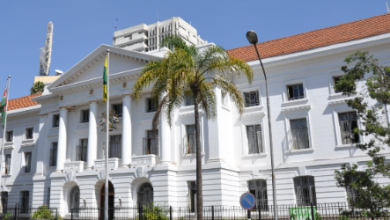Additional Taxes Will Cost 50,000 Jobs in Ride Hailing Sector- Bolt Public Policy Manager

Ride-hailing companies have protested some some of the proposed tax measures in the Finance Bill 2024, arguing that they will make it harder for them to do business, force them to raise cab fares, and eat into drivers’ margins.
In this interview, The Kenyan Wall Street sat with George Abasy, the Public Policy Manager at Bolt, to discuss the proposed taxes, and the lingering commission cap controversy.
Q. What do you think about Finance Bill 2024 and its effects on the ride hailing sector?
GA: We had made our views known to the committee on finance and national planning, regarding the proposed introduction of the significant economic presence (SEP) tax, that the effect was moving the tax burden from 1.5% as it is now in the digital service tax (DST) and renaming it to SEP to 6%. The introduction of 6% SEP plus VAT makes the effective tax to be 22% on profit.
This will have a negative impact on the ride hailing sector. It will make it almost unsustainable to run. It will lead to job losses on 50,000 or so riders. Kenyan riders will not afford to ride on the ride hailing platforms. Our proffered recommendations is that, either this suggestion be dropped and we revert to the DST that we have now or we need to discuss more on how then this will be captured.
It is basically unsustainable. We indicated to them that in Nigeria where it was introduced in April 2022, it led to massive flight of companies from the market.
Q: Is the 50,000 an industry wide estimate?
GA: Yes, an industry estimate, those who ride with us and other platforms and the food delivery.
Q: So this tax structure will mean that ride hailing companies will move the cost to the consumer?
GA: Not really moving but sharing. The stakeholders in this industry are three; rider, the driver and the company. This will essentially mean that riders and drivers who have already been impacted by other taxes will be impacted negatively.
In this sense, in a sector that is already struggling, 70% of drivers have their cars on loans which are already unsustainable. There has been discussion on whether drivers have sustainable earnings and how best should the government address the cost of credit.
To add another 6 percent to drivers/riders will bring pressure on riders/drivers and more pressure on the government. The government is shooting themselves in the foot because they increase the tax to increase their revenue this will definitely reduce the revenue that is already generated by ride hailing companies.
Q. What about the proposed motor vehicle tax and other taxes such as that on batteries?
GA: That’s another layer of tax, for instance, a vehicle that’s already on loan, add acp, add motor vehicle tax, basically it is impractical. We have made strong submissions before the committee that this needs to be dropped. This is impractical and will lead to massive job losses.
Our demographic shows that 70% of drivers are between 18-35, deemed hustlers, including women, and cutting across educational levels. The second impact is immediate loss of revenue. If 50,000 people don’t pay taxes as a result of losing their jobs due to the Finance Bill, then the plan doesn’t work.
The additional tax on the EV industry is impractical. We are directly impacted because we have been trying to move our vehicles and two wheelers to the EV ecosystem so that we fit the global discussion on climate. This reverses that agenda in a major way.
Q: If this bill passes, what’s the pessimistic view?
GA: I am cautiously optimistic that the committee is reconsidering this clause because when we met with the committee, we expected feedback from the honorable members and that needed to be relooked. We will cross the bridge once we get there.
Our first commitment is to stay in the market. We are committed to work with the government and regulators to ensure we stay in the East African market. We are optimistic that the committee will review and the clause will be amended.
Q.What does an ideal tax system look like for a ride hailing company?
GA: An ideal tax system first, is to maintain the status quo. Second, the country needs to have discussion on commission capping. We are regulated by NTSA and there’s a restriction that says the commission we charge on the rides should not go beyond 18%. And we pay VAT and Digital Services Tax on that commission.
The best practice in other jurisdictions including Tanzania is that the company’s commission is capped at 25% and DST at 1.5-2%. There’s no country that goes beyond the 1.5-2%. The nature of the digital working space is to encourage foreign direct investments because technology is not restricted within borders. Technology increases innovation and job creation because we are able to work in a globalized manner learning from the best practices.
It is important that our government learns from these best practices. So that when you regulate in the sense that you overtax technology space, you restrict innovation, income earning and rendering hustlers jobless.
Q: From the outside, the commission cap seems to make sense because it means drivers earn more. How was it decided on?
GA: The statutory Instruments law states that in coming up with a regulation that impacts a financial economy, the regulator must conduct a regulatory impact assessment (RIA). The proposed regulation is then attached to the RIA and forwarded to the national assembly for consideration.
Because of pressure of transition from Uhuru to Ruto’s government, the RIA was never done and therefore not attached. In our view, it is an illegality. The PS made a commitment that the government was conducting an RIA and that within a year, they would have submitted the RIA which had informed the 18% commission capping.
This is the second year of implementation and there’s no scientific or evidential study that suggests that 18% commission is the capping. We have not been told what influenced the commission cap as per law. It was politically expedient to convince the drivers that their problem was the commission cap.
Q. What then influences the pricing mechanism in Kenya?
GA: Let’s follow the law when setting the commission cap. Is it in conflict with Competition Act? Does it fit the best practice? Has it been passed in parliament? Has it resolved problems that drivers have in the market?



